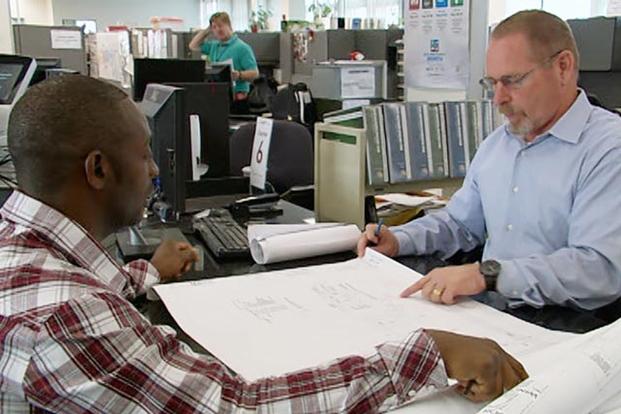No two interviews are ever the same. Every hiring manager will ask different questions and conduct the interview in different ways. But some questions are nearly ubiquitous to the interview process. To help prepare, Alison Doyle has compiled a list of the 10 most common interview questions, which we've collected for you below.
All service members know the importance of planning, and job interviews are no different -- know the questions, practice your answers and you'll be more likely to succeed.
What Is Your Greatest Strength?
This might seem like a no-brainer question to answer, but be careful. Don't use this as an opportunity to soapbox about how wonderful you are; pick a specific ability or skill that relates to the job you're applying for and talk about it. This is one of the easiest times during an interview to sell yourself, so hit the sweet spot of playing up your strengths without boasting. Describe what your greatest skill is and then pick two or three examples that depict it in action.
What Is Your Greatest Weakness?
This question can trip up a lot of people, but not for the reason you might think. While it's never a good idea to let your heart bleed out as you describe your greatest failings in life, this also isn't the time to practice Orwellian doublespeak. The trick is to talk about a genuine work-related weakness, then explain how you handled it.
Don't say that your greatest weakness is perfectionism or being too early; those are strengths, and the interviewer won't be impressed. What really stands out is the ability to accurately self-analyze and change accordingly. It shows maturity, insight and translates well in your work.
How Do You Handle Stress and Pressure?
Stress and pressure are ubiquitous in the working world. No matter how easygoing your workplace might be, there are always problems, snags and emergencies that interrupt plans. The key to answering this question is acknowledging how you overcome personal feelings and solve problems.
Whether your first response is to take 60 seconds to breathe and clear your head or write down solutions on a scrap of paper, emphasize your ability to focus on solutions, self-motivate through adversity and sidestep panic.
Describe a Difficult Work Situation or Project and How You Overcame It.
Similar to answering "how do you handle stress and pressure," this is an opportunity to talk about your problem solving abilities. This question is best answered with a focus on a single example since that's what the question is asking for. Start by setting up the situation, then talk about how you solved it. Cap off your answer with a short and sweet explanation of your thought process, goals, and problem-solving method.

How Do You Evaluate Success?
Your answer to this question will tell employers whether or not you fit the office culture and if you would be a motivated employee. It's a broad, nebulous question, but don't let that scare you. Pick a few measures of success that relate to the job you're applying for; success can mean fostering good communication, completing projects ahead of schedule or finding innovative solutions to certain problems.
Why Are You Leaving, or Why Did You Leave Your Job?
If you left on unfriendly terms with your previous employer, your gut reaction might be to pick apart every single thing that was wrong with them. Do not, at any time for any reason, do this. Unless you were laid off, focus on your inspired need to find new opportunities. You might want to focus on a different kind of work, or perhaps there wasn't any room to grow at your old company. Whatever the reason, the best answers to this question will focus on personal and professional growth.
Why Do You Want This Job?
The answer to this question will be similar to the one above, except instead of explaining why you want to grow, target your answer to the job and company you're applying for. Talk about opportunities the prospective employer will give you and how you will benefit them as a company. No matter the type of job or pay, communicate your interest with specific examples and short plugs about your abilities.
Why Should We Hire You?
Don't just answer this question by saying, "because I'm awesome," or a wordy, detailed version thereof. This is an opportunity to talk about what makes you the right candidate for the position. This requires knowing what the employer is looking for and then matching your skills and experience to it.
What Are Your Goals for the Future?
This question hones in on your ambition: An interviewer who asks this wants to know what you're attempting to achieve. Discuss your plans for the future so that your personal ambition benefits the company.
Tell Me About Yourself.
Arguably, this is the broadest possible question an interviewer can ask, so it's important to be prepared. If you're not good at coming up with answers on the fly, then you may begin to ramble and trail off into personal anecdotes. Answer this question by talking about your professional self: what you can do and what you've accomplished. This is an opportunity to create a well-defined snapshot that will give the employer a good impression.
Related: Does your resume pass the 6-second test? Get a FREE assessment.
Find the Right Veteran Job
Whether you want to polish your resume, find veteran job fairs in your area or connect with employers looking to hire veterans, Military.com can help. Subscribe to Military.com to have job postings, guides and advice, and more delivered directly to your inbox.











